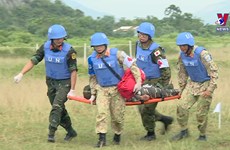Vietnam responses to World Hepatitis Day
Vietnam has joined other eight Western Pacific countries in efforts to
eliminate hepatitis in response to the World Hepatitis Day (July 28)
following a commitment of the World Health Organisation (WHO) Western
Pacific Region.
Vietnam has joined other eight Western Pacific countries in efforts to
eliminate hepatitis in response to the World Hepatitis Day (July 28)
following a commitment of the World Health Organisation (WHO) Western
Pacific Region.
The country also aims to reduce hepatitis B infection among children to under two percent in line with the goal set by WHO.
Vietnam is among nine countries in the Western Pacific region facing serious threat from viral hepatitis, a silent disease, but causing serious impact on public health. However, in recent years Vietnam has made encouraging achievements in the prevention of this disease. More than 50 percent of newborn babies were vaccinated against hepatitis B over the past 10 years, thus remarkably reducing the rate of infection. No Hepatitis A and E epidemics broke out during the past 30 years. Besides, liver transplant techniques have been applied in some big hospitals with dozens of successful liver transplant cases.
In 2012, Vietnam for the first time launched a campaign “All people join hands to beat hepatitis” in response to the appeal of WHO. The campaign has brought about encouraging results: nearly 3 million people have received medical checks and tests for the viral hepatitis, helping detecting hundreds of thousands of cases of hepatitis virus B and hepatitis C infections as well as primary liver cancer. To assist with the care and treatment of patients with viral hepatitis B and C, the Vietnam Association for the Study of Liver Diseases has developed the "Guidelines for liver disease treatment" for all medical establishments nationwide. At the same time, it has also collaborated with the Vietnam Farmers’ Association to launch a contest on viral hepatitis.
To eliminate hepatitis B and lower the rate of infection among children to under two percent, the health sector needs to strengthen education campaigns to raise people’s awareness on the disease and measures to prevent transmission. At the same time, it should expand hepatitis B vaccination to cover all new-born children and high risk groups; ensure safety in blood and blood product transmission and give proper treatment to hepatitis infected pregnant women.
WHO’s experts have warned that primary liver cancer caused by viral hepatitis B and C is increasing in Vietnam, while most patients only come to hospital in the late period, leading to difficulties in treatments. In addition, facilities for detecting and treating the disease are limited, especially in rural and remote areas. High treatment costs are also a problem.
According to WHO, two billion people worldwide are infected with hepatitis B, 200 million people with hepatitis C, and each year more than 1 million people die from hepatitis of all types. In the world, one every 12 people is infected with viral hepatitis.-VNA
The country also aims to reduce hepatitis B infection among children to under two percent in line with the goal set by WHO.
Vietnam is among nine countries in the Western Pacific region facing serious threat from viral hepatitis, a silent disease, but causing serious impact on public health. However, in recent years Vietnam has made encouraging achievements in the prevention of this disease. More than 50 percent of newborn babies were vaccinated against hepatitis B over the past 10 years, thus remarkably reducing the rate of infection. No Hepatitis A and E epidemics broke out during the past 30 years. Besides, liver transplant techniques have been applied in some big hospitals with dozens of successful liver transplant cases.
In 2012, Vietnam for the first time launched a campaign “All people join hands to beat hepatitis” in response to the appeal of WHO. The campaign has brought about encouraging results: nearly 3 million people have received medical checks and tests for the viral hepatitis, helping detecting hundreds of thousands of cases of hepatitis virus B and hepatitis C infections as well as primary liver cancer. To assist with the care and treatment of patients with viral hepatitis B and C, the Vietnam Association for the Study of Liver Diseases has developed the "Guidelines for liver disease treatment" for all medical establishments nationwide. At the same time, it has also collaborated with the Vietnam Farmers’ Association to launch a contest on viral hepatitis.
To eliminate hepatitis B and lower the rate of infection among children to under two percent, the health sector needs to strengthen education campaigns to raise people’s awareness on the disease and measures to prevent transmission. At the same time, it should expand hepatitis B vaccination to cover all new-born children and high risk groups; ensure safety in blood and blood product transmission and give proper treatment to hepatitis infected pregnant women.
WHO’s experts have warned that primary liver cancer caused by viral hepatitis B and C is increasing in Vietnam, while most patients only come to hospital in the late period, leading to difficulties in treatments. In addition, facilities for detecting and treating the disease are limited, especially in rural and remote areas. High treatment costs are also a problem.
According to WHO, two billion people worldwide are infected with hepatitis B, 200 million people with hepatitis C, and each year more than 1 million people die from hepatitis of all types. In the world, one every 12 people is infected with viral hepatitis.-VNA











